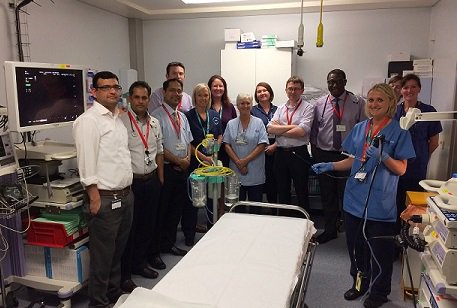 It used to take more than a week for patients to get their results. The EBUS is a minimally invasive procedure, so patients can have it on an outpatient basis. It uses a camera and ultrasound guided needle to take a biopsy of lymph nodes (swellings around main air tubes which are not visible without ultrasound), which can diagnose and stage lung cancer. It can also be used to diagnose lung infections and other diseases that cause enlarged lymph nodes or masses in the chest.
It used to take more than a week for patients to get their results. The EBUS is a minimally invasive procedure, so patients can have it on an outpatient basis. It uses a camera and ultrasound guided needle to take a biopsy of lymph nodes (swellings around main air tubes which are not visible without ultrasound), which can diagnose and stage lung cancer. It can also be used to diagnose lung infections and other diseases that cause enlarged lymph nodes or masses in the chest.It is expected that around 70 to 100 patients will undergo the procedure by March 2018. Dr Shahedal Bari, Deputy Medical Director and Consultant Respiratory Physician, UHMBT, said: “Our aim is to offer compassionate care with not only quality but faster diagnosis and reduced journey for lung cancer patients.”
The EBUS was opened in the Endoscopy Department at the Royal Lancaster Infirmary in April 2017. It will reduce travel for patients from North Lancashire and Cumbria to the closest EBUS services which are based at Liverpool, Preston and Manchester.
GPs will also be able to access instant reports. Suzanne Lofthouse, Clinical Service Manager, UHMBT, said: “This is a fantastic service development for the Trust, not only does it speed up the diagnostic times for patients with suspected lung cancer, it reduces the distance patients are required to travel enabling patient care to be delivered closer to home.”
The Trust diagnoses approximately 230 lung cancer patients every year. There are usually no signs or symptoms in the early stages of lung cancer, but many people with the condition eventually develop symptoms including:
• A persistent cough
• Coughing up blood
• Persistent breathlessness
• Unexplained tiredness and weight loss
• An ache or pain when breathing or coughing
Sue Smith, Executive Chief Nurse, said: “This state-of-the-art machine will benefit patients massively ensuring they receive a timely diagnosis and reducing unnecessary time travelled. Lung cancer is one of the most common and serious types of cancer. Around 44,500 people are diagnosed with the condition every year in the UK.”

